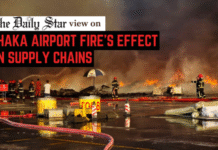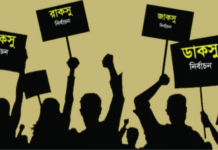Having faced insulting comments and criticism from the ruling party, secretary general of the opposition BNP Mirza Fakhrul Islam Alamgir had wanted to go and stand by the side of the suffering people of Rangamati in the Chittagong Hill Tracts.
But he was not allowed to go. The administration could have prevented him, but no, it was the ruling party people who were the ones to obstruct his way. An attack was launched on Mirza Fakhrul and the other senior BNP leaders who were accompanying him, forcing them to return to Chittagong. Mirza Fakhrul is unfortunate. As it is he is facing 83 cases in court. And now he is paying the price for his active stance in politics. He was assaulted by political miscreants.
Almost all newspapers carried the picture of this important leader of one of the main political parties in the country, shirtless and with his hand in bandages. Some papers carried pictures of the miscreants rushing towards the convoy of cars with poles and sticks. Ittefaq identified the leader of the attack, saying that the road had been blocked, the BNP leaders’ vehicles were stopped and the attack was launched. Even the torrential rains did not dampen the enthusiasm of the attackers. The BNP leaders turned their cars around and took shelter in a mosque and adjoining madrassa about a kilometer away and then the police came to provide security.
The BNP leaders then returned to Chittagong, called a press conference, and held the ruling party responsible for the attack. Referring to the local member of parliament, Mirza Fakhrul said, “The MP of that area holds an important position in Awami League. Investigate to find out if he instigated the incident.”
The MP of Rangunia, the area where Mirza Fakhrul came under attack, is Awami League’s publicity secretary Hasan Mahmud, who termed the incident as ‘mysterious’ and said it seemed to be a staged drama. He claims that the BNP vehicles had hit two pedestrians and so the agitated people had done something. His defensive protests perhaps indicate the opposite.
Rangamati faced the most loss of lives and worst calamity in the series of landslides which hit Rangamati, Khagrchhari and Chittagong on Tuesday, 13 June. A total of 118 died there.
BNP chairperson Khaleda Zia strongly castigated the prime minister for taking off for London and Stockholm on the day of the catastrophe. Naturally her criticism didn’t go down well with many. Awami League was none too pleased. Awami League general secretary Obaidul Quader lost no time in ridiculing the BNP leaders. He and Hasan Mahmud both questioned why the BNP leaders hadn’t gone to Rangamati. Prior to this, similar political mudslinging took place over the calamity in the haors (marshes) of Sunamganj. BNP leaders pointed out that they had been prevented from going to the haors, BNP does not enjoy the same facilities as Awami League.
Awami League’s general secretary Obaidul Quader used the government helicopter to travel there along with a delegation of the party.
Now when BNP’s secretary general Mirza Fakhrul ventured to go there, the obstruction created by over-enthusiastic leaders and activists of Awami League was not only contrary to democracy, but also sends out an ominous signal. Such attacks push politics towards the vicious cycle of vengeance. Is there to be a revival of that culture of revenge where BNP had launched an attack on Sheikh Hasina’s convoy in Satkhira and Khaleda Zia’s convoy came under attack in Karwan Bazar?
Obaidul Kader condemned the attack on Mirza Fakhrul and announced that an inquiry would be made into the incident. His condemnation seemed rather stilted. If he was hesitant over the allegations made against a close colleague in the party, then his promise to investigate the matter is not very convincing. He should instead issue directives for the police to investigate the matter, bring about criminal charges against the persons involved and ensure they are tried and punished.
Many may say that the attack on Mirza Fakhrul is nothing compared to the attempt to kill Sheikh Hasina on 21 August when BNP was in power. The attempt on Sheikh Hasina’s life was a serious and horrendous crime. It has a different dimension as a section of the administration was involved in the attack. When the guilty persons are sentenced through the on-going legal procedures, it will prove that no one is above the law.
The attack on Mirza Fakhrul gives rise to two questions. Firstly, will the government allow BNP to carry out peaceful political programmes? The writing is on the wall when BNP has not been permitted to hold any political gathering in Dhaka for over the last one and a half years and a search was carried out on the party chairperson’s office on a very implausible excuse. Condemning the attack on Mirza Fakhrul, Khaleda Zia said that BNP wanted to join the elections and so all this is being done to keep BNP away from the polls. Such attacks certainly add weight to Khaleda Zia’s accusations.
Secondly, if the ruling party want to ensure BNP’s rightful and recognised rights in democratic politics, is there some powerful lobby within the government that is trying to thwart this? Such an incident points to the government’s failure in maintaining law and order, so why should the government tolerate it? Should we then assume that the Rangunia incident indicates that the centre has no hold on the field level leaders and workers and that the administration is ineffective?
I would like to draw attention to the Bangladesh-related editorial published on 18 June in The Guardian. In the editorial titled ‘People deserve better’, it was said, “Both parties need to re-engage with democracy and civil rights, renounce the use of force and pandering to intolerance, and focus on the needs of their people.” We don’t want lessons from outside. That does not bode well. But can we stop them from speaking out if our political culture doesn’t change?
Source: Prothom Alo









